Fiat Tipo Wagon VS Suzuki Jimny – Specs, Efficiency & Price Comparison
Find out now which car fits your needs better!
The Fiat Tipo Wagon (Estate) is powered by a Petrol MHEV or Diesel engine and comes with a Automatic or Manuel transmission. In comparison, the Suzuki Jimny (Off-Roader) features a Petrol engine and a Manuel gearbox.
When it comes to boot capacity, the Fiat Tipo Wagon offers 550 L, while the Suzuki Jimny provides – depending on what matters most to you. If you’re looking for more power, you’ll need to decide whether the 130 HP of the Fiat Tipo Wagon or the 102 HP of the Suzuki Jimny suits your needs better.
There are also differences in efficiency: 4.70 L vs 7.70 L. In terms of price, the Fiat Tipo Wagon starts at 21000 £, while the Suzuki Jimny is available from 25300 £.
Compare all the key specs now and find out which model fits your lifestyle best!
Fiat Tipo Wagon
The Fiat Tipo Station Wagon offers a spacious and practical solution for families seeking value without sacrificing comfort. Its sleek design and modern interior features create a pleasant driving experience, complemented by a range of user-friendly technology. On the road, the Tipo Estate provides a smooth drive, making it an ideal companion for both urban and longer journeys.
details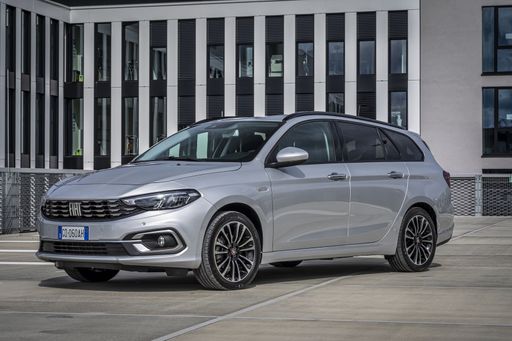 @ media.stellantis.com
@ media.stellantis.com
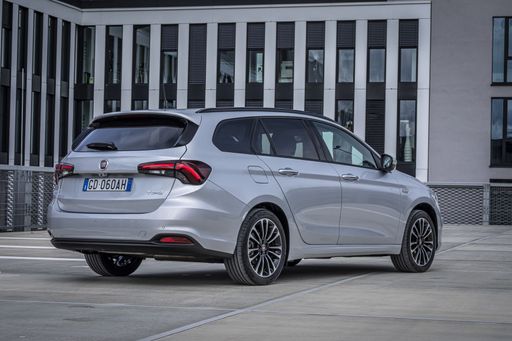 @ media.stellantis.com
@ media.stellantis.com
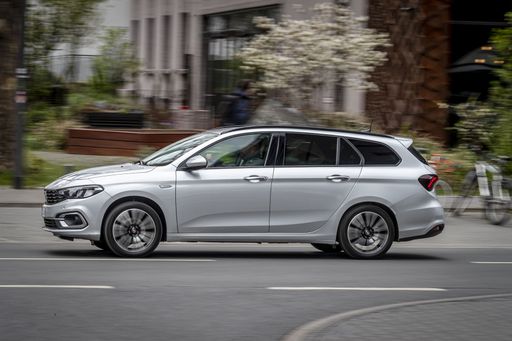 @ media.stellantis.com
@ media.stellantis.com
Suzuki Jimny
The Suzuki Jimny is a compact SUV that has gained a loyal following for its rugged charm and off-road capabilities. Its boxy design is both nostalgic and functional, making it stand out in a sea of more streamlined vehicles. Despite its small size, the Jimny offers a surprisingly robust driving experience, ideal for adventurous journeys off the beaten track.
details @ suzuki.at
@ suzuki.at
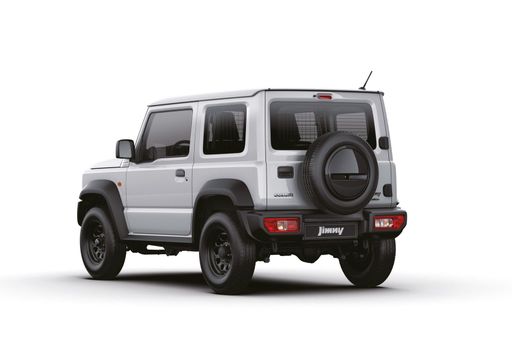 @ suzuki.at
@ suzuki.at
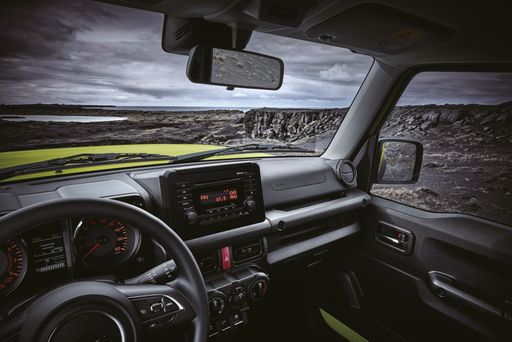 @ suzuki.at
@ suzuki.at
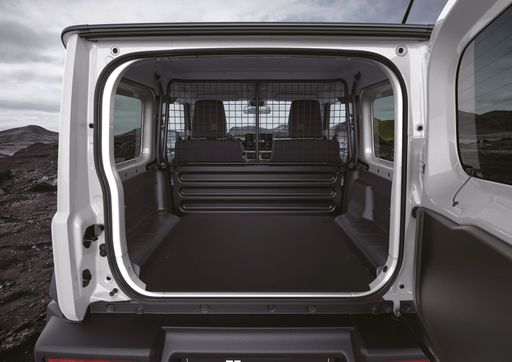 @ suzuki.at
@ suzuki.at

|

|
|
|
|
Costs and Consumption |
|
|---|---|
|
Price
21000 - 27000 £
|
Price
25300 - 27700 £
|
|
Consumption L/100km
4.7 - 5.4 L
|
Consumption L/100km
7.70 L
|
|
Consumption kWh/100km
-
|
Consumption kWh/100km
-
|
|
Electric Range
-
|
Electric Range
-
|
|
Battery Capacity
-
|
Battery Capacity
-
|
|
co2
122 - 125 g/km
|
co2
173 g/km
|
|
Fuel tank capacity
50 L
|
Fuel tank capacity
40 L
|
Dimensions and Body |
|
|---|---|
|
Body Type
Estate
|
Body Type
Off-Roader
|
|
Seats
5
|
Seats
2
|
|
Doors
5
|
Doors
3
|
|
Curb weight
1455 - 1470 kg
|
Curb weight
1165 kg
|
|
Trunk capacity
550 L
|
Trunk capacity
-
|
|
Length
4571 mm
|
Length
3645 mm
|
|
Width
1792 mm
|
Width
1645 mm
|
|
Height
1514 mm
|
Height
1705 mm
|
|
Payload
475 kg
|
Payload
270 kg
|
Engine and Performance |
|
|---|---|
|
Engine Type
Petrol MHEV, Diesel
|
Engine Type
Petrol
|
|
Transmission
Automatic, Manuel
|
Transmission
Manuel
|
|
Transmission Detail
Dual-Clutch Automatic, Manual Gearbox
|
Transmission Detail
Manual Gearbox
|
|
Drive Type
Front-Wheel Drive
|
Drive Type
All-Wheel Drive
|
|
Power HP
130 HP
|
Power HP
102 HP
|
|
Acceleration 0-100km/h
9.1 - 10.1 s
|
Acceleration 0-100km/h
12.80 s
|
|
Max Speed
206 - 207 km/h
|
Max Speed
145 km/h
|
|
Torque
240 - 320 Nm
|
Torque
130 Nm
|
|
Number of Cylinders
4
|
Number of Cylinders
4
|
|
Power kW
96 kW
|
Power kW
75 kW
|
|
Engine capacity
1469 - 1598 cm3
|
Engine capacity
1462 cm3
|
General |
|
|---|---|
|
Model Year
2024
|
Model Year
2021 - 2024
|
|
CO2 Efficiency Class
D
|
CO2 Efficiency Class
F
|
|
Brand
Fiat
|
Brand
Suzuki
|
Fiat Tipo Wagon
Introduction to the Fiat Tipo Station Wagon
The Fiat Tipo Station Wagon has long been a staple in the automotive world, celebrated for its practical design, spacious interior, and affordability. The 2024 model continues this tradition, offering impressive updates in technology and performance, making it a significant contender in the compact estate car market. Here, we take a closer look at what makes the Fiat Tipo Kombi a standout choice.
Engine and Performance
Under the bonnet, the Fiat Tipo Station Wagon showcases its versatility with a choice of powertrains. Its offerings include a 1.5 GSE Hybrid with a mild-hybrid system that enhances fuel efficiency and provides a responsive driving experience. This engine choice delivers 130 PS and achieves a commendable fuel consumption rate of 5.4 L/100km.
For diesel enthusiasts, the 1.6 MultiJet engine provides a robust performance with the same 130 PS but boasts an even lower fuel consumption of 4.7 L/100km. Both engine variants offer a front-wheel drive system which is complemented by either a dual-clutch automatic transmission or a traditional manual gearbox, ensuring a pleasurable driving experience tailored to individual preferences.
Advanced Technology and Innovations
The 2024 Fiat Tipo Station Wagon is equipped with a suite of modern technologies, enhancing both safety and convenience. The model features an advanced infotainment system that integrates seamlessly with smartphones, offering navigation, media, and communication tools via a sleek and intuitive touchscreen interface.
On the safety front, the Tipo Station Wagon is equipped with various driver assistance systems, including adaptive cruise control and lane-keeping assist, ensuring both comfort and security on the road. These innovations reflect Fiat's commitment to merging safety with cutting-edge technology.
Design and Comfort
From a design perspective, the Fiat Tipo Station Wagon maintains a sleek and modern aesthetic, characterised by clean lines and a distinctive front grille that conveys confidence. The vehicle's dimensions (4571 mm in length, 1792 mm in width, and 1514 mm in height) provide ample space for passengers and gear, while a generous boot offers 550 litres of cargo capacity.
Inside, the Tipo Station Wagon is designed with comfort in mind, accommodating five passengers comfortably. The interior cabin is spacious, with quality materials and ergonomic seating ensuring that long journeys are undertaken in comfort.
Efficiency and Environmental Considerations
Efficiency is at the core of the Fiat Tipo Station Wagons design, as evidenced by its low fuel consumption figures and CO2 emissions ranging between 122 and 125 g/km, securing a CO2 efficiency class of D. This makes the vehicle an environmentally conscious choice without sacrificing performance or convenience.
Conclusion
For those in search of a reliable, spacious, and technologically advanced vehicle, the Fiat Tipo Station Wagon stands out as an excellent option. Its combination of performance, efficiency, and modern technology, all wrapped in a stylish design, ensures that it remains a top choice for 2024 and beyond.
Suzuki Jimny
Revamping Tradition with Modern Twists: The Suzuki Jimny
The Suzuki Jimny continues its legacy as a robust compact off-roader, seamlessly blending its iconic design with modern technological advancements. Whether traversing rugged terrains or cruising urban streets, the Jimny stands out as a versatile companion.
A Legacy Reimagined: Design and Build
Suzuki stays true to its roots with the Jimny's classic square silhouette. This three-door compact SUV is not just about aesthetics; its dimensions—with a length of 3645 mm, a width of 1645 mm, and a height of 1705 mm—are designed to tackle off-road challenges effortlessly. With its compact build, the Jimny fits snugly into city parking spots whilst still radiating an aura of toughness.
The Heart of the Machine: Engine and Performance
Powered by a 1.5-litre four-cylinder engine, the Jimny delivers 102 PS and 130 Nm of torque. Its petrol engine is paired with a manual transmission, offering drivers a more connected and tactile driving experience. With a fuel consumption of 7.7 L/100km, it strives to balance power and efficiency. The Jimny's maximum speed peaks at 145 km/h, while it accelerates from 0 to 100 km/h in 12.8 seconds, a testament to its steadfast performance in its category.
Mastering Terrains with ALLGRIP PRO
One of the standout features of the Jimny is its ALLGRIP PRO all-wheel-drive system, designed for serious off-roaders. This technology provides the driver with the ability to switch between 2WD and 4WD at the flick of a switch, ensuring maximum traction no matter the condition. The elevation of its chassis and its tough underbody protection mean the Jimny can handle rough landscapes with relative ease.
Comfort Meets Functionality: Interior Features
Step inside, and you'll find an interior that perfectly balances utility and comfort. The Jimny might be a two-seater, but its thoughtful design ensures ample space for both driver and passenger. The dashboard is simple yet functional, equipped with essential features that accentuate the driving experience without unnecessary distractions.
The Green Concerns: Environmental Impact
While the Jimny offers impressive off-road capabilities, its CO2 emissions stand at 173 g/km, placing it within efficiency class F. This is an area where environmentally conscious buyers might seek further innovation from Suzuki. Despite this, the Jimny remains a preferable choice for those who value performance over emission metrics.
Balancing Act: Cost and Affordability
Priced between €29,490 and €32,340, the Jimny positions itself within a competitive market segment. Potential owners will be making a modest investment for a vehicle that promises both durability and versatility. With monthly costs estimated at €940 and €0.376 per kilometre, it remains an affordable option for those who prioritise capability over luxury.
In Conclusion: A Symbol of Reliability
The Suzuki Jimny is more than just a car; it’s a lifestyle choice for adventurers who refuse to conform to the ordinary. With years of trust behind it, the Jimny has successfully adapted to the needs of the modern driver without compromising its rugged essence. Whether you're scaling new heights or navigating city landscapes, the Jimny proves itself a worthy companion on any road less travelled.
The prices and data displayed are estimates based on German list prices and may vary by country. This information is not legally binding.
